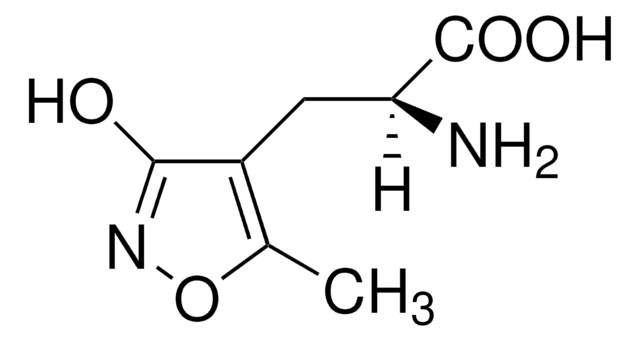C9847
Cyclothiazide
Synonyme(s) :
6-Chloro-3,4-dihydro-3-(2-norbornen-5-yl)-2H-1,2-4-benzothiadiazine-7-sulfonamide 1,1-dioxide
About This Item
Produits recommandés
Forme
powder
Niveau de qualité
Auteur
Eli Lilly
Température de stockage
2-8°C
Chaîne SMILES
[H][C@@]12CC(C3Nc4cc(Cl)c(cc4S(=O)(=O)N3)S(N)(=O)=O)[C@@]([H])(C1)C=C2
InChI
1S/C14H16ClN3O4S2/c15-10-5-11-13(6-12(10)23(16,19)20)24(21,22)18-14(17-11)9-4-7-1-2-8(9)3-7/h1-2,5-9,14,17-18H,3-4H2,(H2,16,19,20)/t7-,8+,9?,14?/m0/s1
Clé InChI
BOCUKUHCLICSIY-QJWLJZLASA-N
Informations sur le gène
human ... CA1(759) , CA4(762) , GRIA1(2890) , GRIA2(2891) , GRIA3(2892) , GRIA4(2893)
rat ... Gria1(50592)
Vous recherchez des produits similaires ? Visite Guide de comparaison des produits
Description générale
Application
Actions biochimiques/physiologiques
Caractéristiques et avantages
Code de la classe de stockage
11 - Combustible Solids
Classe de danger pour l'eau (WGK)
WGK 2
Point d'éclair (°F)
Not applicable
Point d'éclair (°C)
Not applicable
Équipement de protection individuelle
dust mask type N95 (US), Eyeshields, Gloves
Certificats d'analyse (COA)
Recherchez un Certificats d'analyse (COA) en saisissant le numéro de lot du produit. Les numéros de lot figurent sur l'étiquette du produit après les mots "Lot" ou "Batch".
Déjà en possession de ce produit ?
Retrouvez la documentation relative aux produits que vous avez récemment achetés dans la Bibliothèque de documents.
Articles
DISCOVER Bioactive Small Molecules for Neuroscience
Notre équipe de scientifiques dispose d'une expérience dans tous les secteurs de la recherche, notamment en sciences de la vie, science des matériaux, synthèse chimique, chromatographie, analyse et dans de nombreux autres domaines..
Contacter notre Service technique








